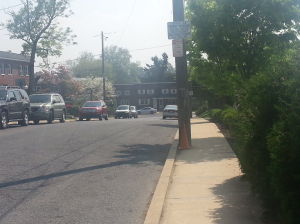5/26/2014
Additional parking also needed for the welfare recipients created by Obamanomics. As pointed out by a union steward, the office caseload doubled between 2008-2013.

Additional parking also needed for the welfare recipients created by Obamanomics. As pointed out by a union steward, the office caseload doubled between 2008-2013.

Lafayette Street behind the state welfare office on Manor Street on a recent weekday early in the afternoon. The two-hour limit is enforced for the full block, so moving a vehicle to a different spot on the block keeps the clock ticking rather than restarting it.
The state welfare office at Manor Street and Fairview Avenue in Lancaster city provides 175 spaces for its 200 employees.
The parking crunch is an issue for employees, clients and nearby city residents.
Along with employees competing for parking spaces are the 30 or so clients the office serves at any given time.
Aside from eight spaces designated for managers and five for people with handicaps, parking in three nearby lots is available on a first-to-the-spot basis. The rest of the employees and clients find parking on nearby streets.
“They’re parked everywhere,” according to Kelly Richards, whose home is on Lafayette Street, across from the rear of the welfare office.
The city, Richards said, doesn’t do enough to enforce the two-hour parking limit on Lafayette Street for cars without resident parking stickers.
On that point, there is some dispute.
Ron Kurek, union steward at the welfare office, believes the city is making money on the situation when it could ease the restrictions on the west side of Lafayette during office hours.
In the year ended March 31, the city wrote $3,065 in tickets for vehicles illegally parked there, just behind the office.
“Why is this side of the street even permit parking when there’s no houses?” Kurek asked.
Eliminating the permit requirement from the west side of Lafayette Street would provide about 25 extra spaces, Kurek said.
“When you see $3,000 a year, it seems it’s just a money-maker,” he said.
Randy Patterson, Lancaster’s director of economic development and neighborhood revitalization, said Kurek’s issue is not with the city.
“He needs to address that with his employer,” Patterson said.
“The employer (the state Department of Public Welfare) would have the opportunity to investigate securing other off-site parking,” he said.
A neighbor, who was part of a group that years ago successfully appealed to the city to institute permit parking on Lafayette Street, said there is a good reason for the restriction.
Many Lafayette Street residents, he said, have two vehicles per household, are retired, or work shifts that bring them home during office hours.
That means Kurek’s proposal to abolish the two-hour limit during office hours would force residents to walk from their cars to their homes, as they did before permit parking was instituted.
Possible solutions
First, in case you’re wondering, yes, the Department of Public Welfare’s landlord, Girard Estate, provides more than the 145 parking spaces required under its lease with the state, according to the estate’s spokesman, Kevin Feeley.
“We believe we provide ample parking there,” he said.
But the office’s caseload doubled between 2008 and 2012, leading to more employees and more spaces being needed for both employees and clients, Kurek said.
“This has been an issue for the six years that I have worked here,” and it has only gotten worse, Kurek said.
So, can the DPW find more parking for its employees?
According to DPW spokeswoman Kait Gills, “You don’t get parking with your job.”
She said, “It’s not owed to them,” and it’s not part of the employees’ union contract.
There is bus service nearby, she pointed out.
Red Rose Transit Authority buses stop right in front of the welfare office and around the corner on Prospect Street.
How about getting employees a break on fares to encourage them to take the bus, as the County of Lancaster and Lancaster General Health do?
Those employers pay a portion of each employee’s bus pass. The county pays the first $15 of each 31-day pass; LGH pays $14 for the 31-day pass or $2 toward a 10-ride pass.
“That might not be a wise use of taxpayer dollars,” Gillis said.
Other employers get a $1-per-pass discount for their employees by providing the RRTA with monthly reports showing how many passes they’ve sold and have left.
“We would be happy to help set something up for the welfare office for their employees,” Jennifer L. Boley, marketing manager for the RRTA, said last week.
Some employers “deduct the pass cost directly from the employee’s paycheck,” she said. “We basically let the business customize how they would like to offer the passes to their employees.”
Gillis said the DPW is sympathetic to its employees’ parking plight.
“We are working to try to rectify that, if there is a possible parking alternative.”
The state is open, Gillis said, to any solution the city might be able to offer. Something it might want to consider, given the good jobs provided at the welfare office, she said.
No comments:
Post a Comment